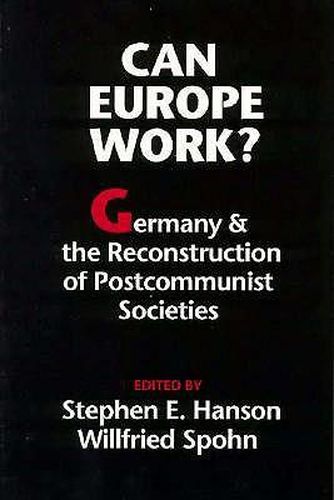Readings Newsletter
Become a Readings Member to make your shopping experience even easier.
Sign in or sign up for free!
You’re not far away from qualifying for FREE standard shipping within Australia
You’ve qualified for FREE standard shipping within Australia
The cart is loading…






In Can Europe Work? Germany and the Reconstruction of Postcommunist Societies, eight scholars from the United States and Europe discuss the problems posed for European unity by the collapse of communism and the reemergence of Germany as Europe’s strongest state. Among the topics addressed are a comparison of nationalism in Western and Eastern Europe, the intellectual origins of the often antiliberal and antidemocratic East European nationalism, deteriorating popular support for the Polish Roman Catholic Church, a comparative analysis of the German nation-state in the nineteenth and twentieth centuries, German economic influence in East Central Europe, the role of Germany in the breakup of Yugoslavia, the causes of recession in Eastern Europe, and a sobering study of Russia’s current economic problems. The book is expected to attract a large audience in both North America and Europe among academic specialists on the region as well as those concerned with policy issues arising from the turbulent environment of postcommunist East Central Europe.
$9.00 standard shipping within Australia
FREE standard shipping within Australia for orders over $100.00
Express & International shipping calculated at checkout
In Can Europe Work? Germany and the Reconstruction of Postcommunist Societies, eight scholars from the United States and Europe discuss the problems posed for European unity by the collapse of communism and the reemergence of Germany as Europe’s strongest state. Among the topics addressed are a comparison of nationalism in Western and Eastern Europe, the intellectual origins of the often antiliberal and antidemocratic East European nationalism, deteriorating popular support for the Polish Roman Catholic Church, a comparative analysis of the German nation-state in the nineteenth and twentieth centuries, German economic influence in East Central Europe, the role of Germany in the breakup of Yugoslavia, the causes of recession in Eastern Europe, and a sobering study of Russia’s current economic problems. The book is expected to attract a large audience in both North America and Europe among academic specialists on the region as well as those concerned with policy issues arising from the turbulent environment of postcommunist East Central Europe.